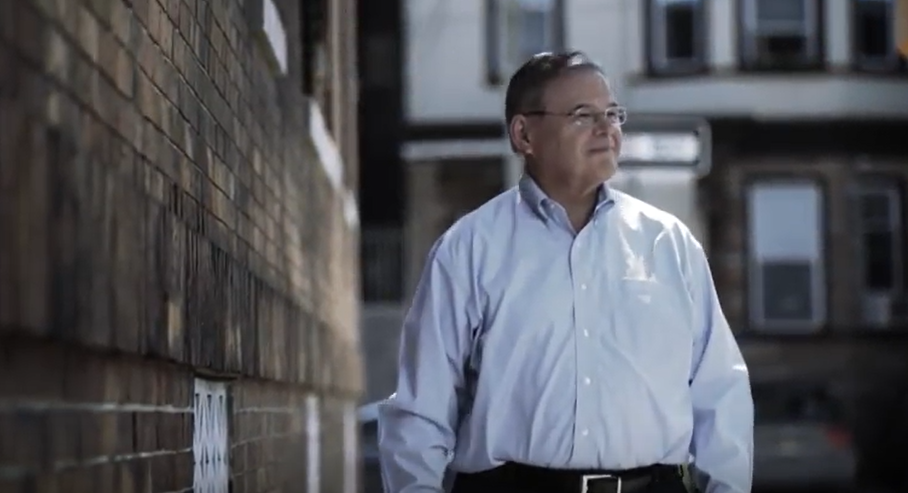State of the Race: Menendez V. Hugin

In the 46 years since New Jersey voters last sent a Republican to the U. S. Senate, only two subsequent elections can be defined as competitive; that is, in which the margin of victory for the Democratic candidate was under five per cent --- against former Gov. Christie Whitman in 1990 and former Assembly Speaker Chuck Haytaian in 1994.
Each lost by three points --- Whitman to Sen. Bill Bradley and Haytaian to Sen. Frank Lautenberg --- and there are still some Republicans who haven’t forgiven the Republican National Committee or its fundraising arm for refusing to divert additional resources to the campaigns because they were convinced the GOP cause was lost.
Even though the morning after miraculously provides crystal clear vision, there is a compelling case to be made that a television advertising blitz in the last week or 10 days of the campaigns could have overcome a three-point lead and made the difference for both Whitman and Haytaian.
To be sure, Bradley and Lautenberg were strong candidates and may have weathered a last ditch all out assault, but there remains the tantalizing possibility that, but for a decision made in Washington, D, C., the Democrats’ lock on New Jersey’s Senate seats could have been broken.
This bit of history is somewhat instructive, given that entering the final month of this years’ Senate contest, the Democratic candidate, Sen. Bob Menendez, is weaker than either Bradley or Lautenberg, weighted down by the baggage of his ethical misbehavior.
The Republican challenger, retired biopharmaceutical executive Bob Hugin, needn’t turn to the national party for sustenance; he’s already put some $15 million of his own money into the campaign and stands ready to up the ante.
Given the Whitman/Haytaian experience, it is ironic that Menendez is the subject of a rescue mission by his national party which hadn’t anticipated any need to apply financial or organizational resources to a state in which the party has held both Senate seats for nearly half a century.
Hugin’s television campaign has pulled him to within single digits of Menendez, and he actually enjoys a 10-point led, 46 to 36, as measured by a Stockton Polling Institute survey in the Second Congressional District covering all of Atlantic, Cape May, Cumberland and Salem counties and portions of four others. His making up considerable ground and spending heavily has created some nervousness in the Democratic party, worried that the Senator’s trial on Federal corruption charges and the subsequent harsh judgment of the Senate Ethics Committee on his behavior have had a significant negative impact on voters’ perception of him.

He walked out of the Federal courthouse in Newark last year after a jury failed to reach a unanimous verdict on the charges against him, denying a sense of closure and --- fairly or not --- creating the impression that the Senator escaped punishment on a technicality, that he was not acquitted but set free because government prosecutors failed to prove their case. The Justice Department conceded as much when it subsequently dismissed the remaining charges rather than undertake a re-trial with essentially the same evidence.
The Senate Ethics Committee, however --- a panel of Menendez’ peers --- rendered a harsh judgment, finding that Menendez had brought discredit on the Senate by using his office to seek favored treatment for a friend in return for airline trips, vacations, gifts and campaign contributions.
The friend, a Florida physician, is serving a prison sentence for cheating Medicare of millions of dollars.
The Hugin campaign has built its effort almost entirely around Menendez’ recent history, depicting him as someone who has corrupted his office and does not deserve re-election. He’s placed millions of dollars behind the ad campaign, hoping that at a time and in an environment in which ethical conduct has become an increasing concern, the Senator’s record will turn disaffected Democrats and independents away to either vote Republican or express their displeasure by not casting a ballot for Menendez.
Democrats have rallied behind the Senator, a remarkably sharp contrast to 2002 when party leaders quickly distanced themselves from former Sen. Robert Torricelli after he was admonished by the Ethics Committee for accepting gifts and was forced to abandon his re-election bid.
The leadership has closed ranks behind Menendez, disguising successfully whatever misgivings or reservations they may have about his recent past while cheering at “We’re With Bobby” rallies.
They’ve ignored the ethics issue, instead counterattacking Hugin for what they argue is a record of corporate greed in his role as chief executive of the Celgene Corp. Under his stewardship, Democrats claim, the firm kept the price of a cancer fighting drug artificially high, leading to needless patient suffering.
While he’s flirted with other lines of attack, the central theme of the Menendez campaign remains Hugin’s leadership role in the pharmaceutical industry.
The Republican’s earlier support for President Trump is a target of opportunity for Menendez as well and, with Trump’s approval rating in New Jersey ranging from dismal to disastrous and not likely to improve, the Senator’s campaign believes voters will be loath to send someone to the Senate who will support the President’s initiatives.
The Senator cannot re-write his recent history or frame the Ethics Committee’s criticism as an unimportant wrist slap. Distraction is his goal, hoping that his sins are viewed as less egregious than those of the chief executive of a pharmaceutical company, a vocation not held in particularly high regard at the moment.
He will rely as well on the substantial voter registration edge Democrats hold over Republicans --- some 900,00 at last count.
A Menendez re-election won’t be construed as voters excusing his ethical shortcomings, but rather can be attributed in considerable measure to the state’s long history of Democratic successes in Senate contests, the party registration gap and a desire to deliver a public rebuke to the President.
Still, it is a single digit race and with Hugin, pen in hand, poised over his checkbook, is likely to remain so. 2018 could potentially join 1990 and 1994 as competitive races, decided by three points and either extending the Republican losing streak to more than 50 years or breaking it by convincing voters that personal conduct in office matters most.
Carl Golden is a senior contributing analyst with the William J. Hughes Center for Public Policy at Stockton University.






Carl, you are definitely more rational and balanced than that fool Steinberg. I think you should have also mentioned that the unions and urban Democrat machines will crank out the vote for Menendez, while the GOP is not really enthusiastic about Hugin. Unfortunately, the GOP has no one positioned for a statewide run - Christie made sure of that.
The president is more popular in NJ than what the polls show. Get out of your ivy tower and talk to the common folk Golden!